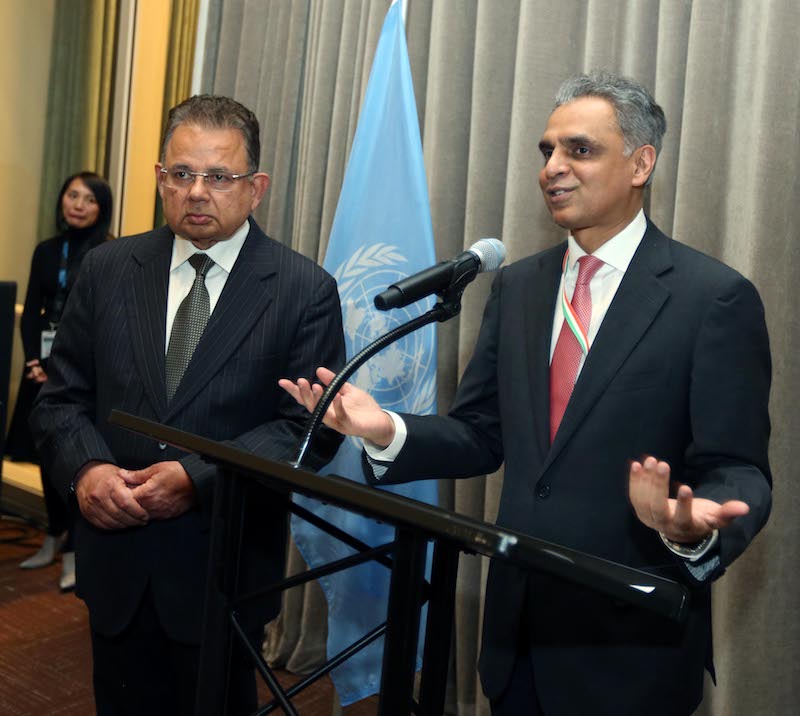Bhandari secured 183 of the 193 votes in the General Assembly and all 15 votes in the Security Council
Prakash M Swamy
UNITED NATIONS (TIP): The General Assembly and the Security Council of the United Nations, on November 20, elected the fifth judge to the International Court of Justice (ICJ) concluding the 2017 elections to the principal judicial organ of the United Nations.
Justice Dalveer Bhandari, of India, received the absolute majority of votes in elections – conducted independently, but concurrently – at the Security Council and the General Assembly. He remained the sole candidate for the position after the United Kingdom withdrew the nomination of Christopher Greenwood.
Bhandari joins Ronny Abraham of France, Antônio Augusto Cançado Trindade (Brazil), Nawaf Salam (Lebanon), and Abdulqawi Ahmed Yusuf (Somalia) as the five judges who will serve along with ten other judges at the ICJ. Their nine-year terms begin 6 February 2018.
The Court is composed of 15 judges, who are elected by an absolute majority in both the General Assembly and Security Council. Five seats come up for election every three years. There is no bar on consecutive terms.
Established in 1945, and based in The Hague in the Netherlands, the ICJ – informally known as the ‘World Court’ – settles legal disputes between States and gives advisory opinions on legal questions that have been referred to it by other authorized UN organs. The election of the first members of the World Court took place on 6 February 1946, at the first session of the UN General Assembly and Security Council.
Bhandari was re-elected with more than two-thirds of the UN members backing him, forcing Britain to withdraw its candidate amidst high drama in the hard-fought race to the world court.
In one of its “biggest diplomatic victories” in the UN, Bhandari got 183 of the 193 votes in the General Assembly and secured all 15 votes in the Security Council to fill the final vacancy on The Hague-based International Court of Justice after separate but simultaneous elections were held at The UN headquarters.
The Ministry of External Affairs and Permanent Mission of India to the United Nations in New York mounted stellar efforts since June when New Delhi confirmed Dalveer Bhandari’s name for the International Court of Justice.
India’s Ambassador to the United Nations Syed Akbaruddin sought the support of nearly 175 nations, including the permanent members of the Security Council. External Affairs Minister Sushma Swaraj telephoned her counterparts from nearly 60 countries to get Bhandari re-elected.
Prime Minister Narendra Modi sought the support during his meetings with world leaders. “India never indulged in negative campaign. It was run on the strength of our candidate and strength of India strong constitutional system,” a diplomat said.
British Permanent Representative to the UN Matthew Rycroft also mounted hectic efforts. Rycroft said in his letter to the members the current deadlock is unlikely to be broken by further rounds of voting and the UK therefore has decided to withdraw Greenwood’s nomination.
“In taking this step, we have borne in mind the close relationship that the United Kingdom and India have always enjoyed and we will continue to enjoy…,” Rycroft said. According to sources, three hours before the voting, General Assembly president Miroslav Lajcak and Italian ambassador Sebastiano Cardi in his capacity as Security Council president for the month of November convened a consultative meeting with Rycroft and Akbaruddin.
India refused to budge against any kind of pressure and insisted to complete the democratic process. It was a mystery what transpired in the next two hours that forced Britain to withdraw from the race.
In Washington, US President Donald Trump convened a meeting with secretary of state Rex Tillerson and the US Ambassador to the UN Nikki Haley. With Bhandari’s election, Britain will not have a judge on the world court’s 15-member panel for the first time. Also for the first time in 70 years, a permanent member of the Security Council lost to a non-permanent member for a seat in the ICJ.
Bhandari’s victory is also a big boost for India in Kulbhushan Jadhav’s case. The ICJ is likely to deliver its verdict in the case in December. Pakistan has already appointed an ad-hoc judge to the ICJ for the case. Bhandari’s victory means, now India will also have its own judge in the court. The ICJ has a bench of 15 judges, five of whom are elected every three years for a nine-year term. To be elected, the candidate needed majority in both the chambers.
